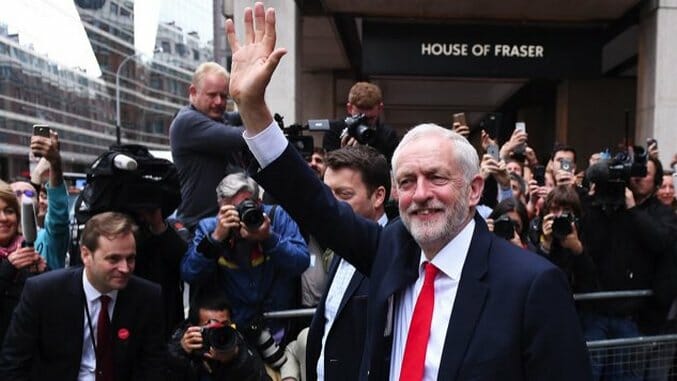What the American Left Can Learn From Jeremy Corbyn’s Big Night in the UK
Photo by Chris J Ratcliffe/Getty
It’s been a long time since anything truly good has happened for the small but resurgent international left. The performance of the Labour Party in the United Kingdom general election last night changed that.
The party, led by the socialist leader Jeremy Corbyn — who has often been compared to Bernie Sanders here — vastly outperformed expectations and picked up dozens of seats, pushing the conservatives out of a majority in an election that was supposed to be a landslide and into a hung Parliament. They even took one seat that had been held by the Tories for a full century.
A quick look at the electoral map right now #GE2017pic.twitter.com/vRcETACw2w
— TechnicallyRon (@TechnicallyRon) June 9, 2017
It looks like the Tories will be able to form a majority coalition or arrangement with the conservative N Democratic Unionist Party of Northern Ireland, but Prime Minister Theresa May is far weaker than anyone expected at the beginning of the campaign. More importantly, Corbyn’s message is far stronger than anyone expected, and it seems all but certain that he’ll stay on as leader of the party for the foreseeable future.
We’re two completely different countries, but the struggle for the left is international now. We’re all facing the same dehumanizing austerity, the same impending climate catastrophe. To see ideological siblings in the United Kingdom — in a country with which the United States has been so closely connected for all of its history — rally for a result that was plainly unthinkable when the campaign started is genuinely one of the most inspiring and remarkable things to happen in an absolutely dogshit last few years.
With that in mind, the American left can take a few lessons from Corbyn and Labour’s incredible night.
First and foremost, that the future is exceedingly bright. Before the election, one poll showed that Labour was actually ahead by three points in one unadjusted poll, but the adjusted result put the Tories up by five by taking out, according to the Independent, “those historically unlikely to vote, who include black and ethnic minorities as well as the under 35s and the least well off older people.”
As the numbers showed, that was a mistake.
In 2015, Miliband won the youth vote by 15 points.
In 2016, Clinton won it by 18 points.Tonight’s exit poll: Corbyn won it by 44 points